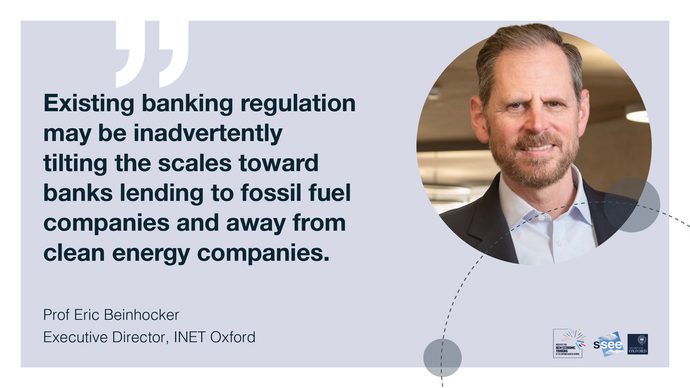- Research identifies structural bias in financial accounting rules that could strongly limit the amount of finance available for the green transition;
- Backward-looking regulations inflate the risk for low-carbon investments, impeding the clean energy transition;
- Experts call for an urgent update to European financial regulations to meet climate change policies and deliver a fast energy transition.
Backward-looking financial models are tilting the scales in favour of fossil fuels and holding back a fast and cost-effective energy-transition in Europe, researchers from the University of Oxford have said.
The study, led by Oxford’s Matteo Gasparini and published today in Nature Climate Change, found that an implicit bias existed in financial accounting rules - a key driver of profitability for banks – which inflates the cost of divesting from high carbon industries towards renewables.
Under European financial regulations, banks must account for risk in firms and investments. Capital requirements, for example, force banks to hold higher capital buffers for investments that are estimated to be riskier.
However, during a detailed analysis of data from the European Banking Authority transparency exercise, the research team found that the statistical models that are widely used by banks to comply with these regulations produce a lower risk rating for high carbon (1.8%) than low carbon sectors (3.4%). The difference was likely caused by the backward-looking nature of financial models.
The researchers found that this gap produces a significant implication for banks’ return on capital and profitability, heavily influencing management decisions, and creating disincentives for financial institutions to divest their portfolios from high carbon assets. The authors have called for European financial regulations to be urgently updated to reflect future risk more accurately.
Lead author Matteo Gasparini of the Oxford Smith School of Enterprise the Environment and the Institute for New Economic Thinking at the Oxford Martin School said that the research highlighted a structural barrier to achieving net zero in Europe that hadn’t been widely talked about.
“Financial regulations are extremely important. They provide the guidelines for the financial system to work properly. However financial regulations might have some side effects.
“In this paper we show that some types of financial regulation might create disincentives to banks to divest from carbon intensive activities. By doing so they might slow down the investments required for a clean energy transition.
“Financial, supervisors, regulators, standard-setting bodies might consider this in their work and further research is also needed to better understand how this might impact broader environmental objectives.
Professor Eric Beinhocker, Executive Director of the Institute for New Economic Thinking at the Oxford Martin School, said that it was vital that banking regulation be updated to more accurately reflect the risks of investment.
“Our team’s research found that existing banking regulation may be inadvertently tilting the scales toward banks lending to polluting fossil fuel companies and away from clean energy companies.
“The reason for this is that banking regulations work backwards of the risks which banks historically had in their lending. And so banks make a higher return on lending toward fossil fuel companies rather than clean energy companies.
“The solution to this bias is that banking regulation needs to be updated to be more forward-looking, to take into account the fact that clean energy technologies are now much cheaper, supported by policy and less risky, and doing this will help shift capital toward the clean energy future.
Dr Matthew Ives, Associate of the Institute for New Economic Thinking at the Oxford Martin School, said that there were economic incentives for a fast energy transition.
“Research we published in the journal Joule in 2022 showed there was strong economic incentives for a fast energy transition as it could save the world trillions due to investment in clean energy technologies like solar, wind and batteries, driving down total energy system costs.
"As we inevitably undertake this major economic transition to clean energy, the historically low risk of high carbon energy becomes an increasingly unreliable predictor of their future risk. The financial regulations need to be urgently updated to address this new source of systemic risk for the banks.”
Key Links:
- Policy Brief: Model-based financial regulation challenges for the net-zero transition | Nature Climate Change
- Behind the Paper, by Matteo Gasparini: Tilting the scales, how our research identified a strategic barrier to the energy transition | Research Communities by Springer Nature
Press coverage:










